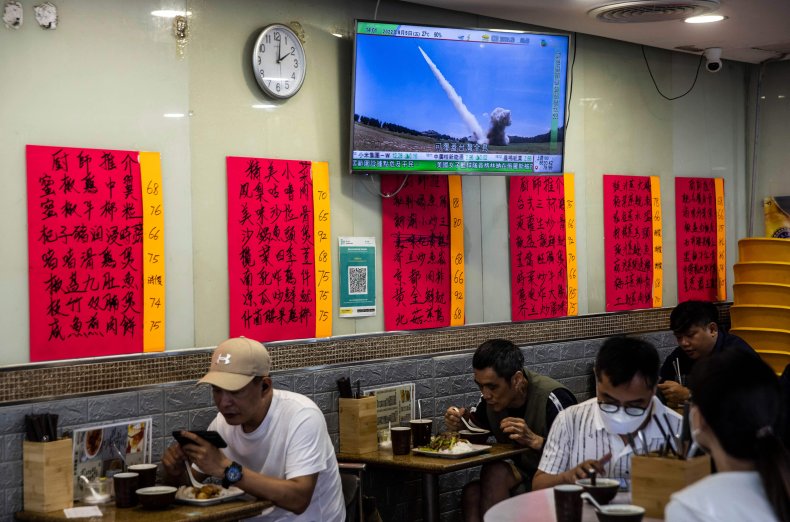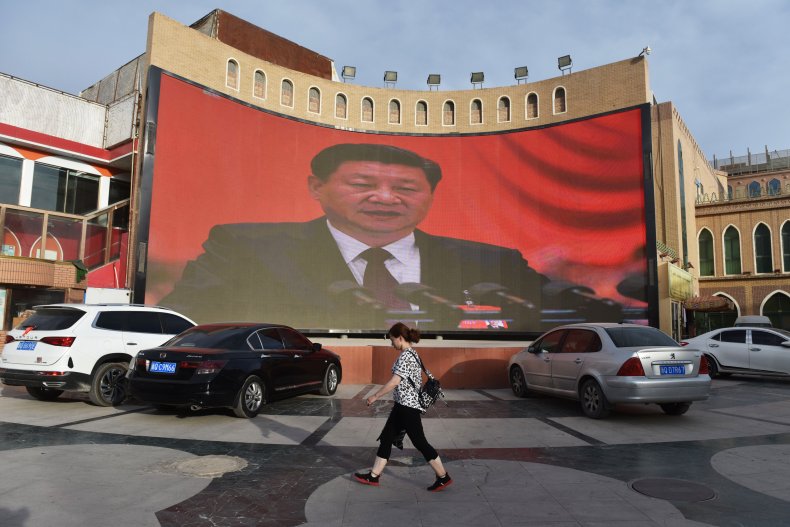Millions of federal employees can invest in Chinese companies sanctioned by the U.S. government via its flagship retirement plan, even though these companies have been branded a danger to national security or are accused of profiting from forced labor or other human rights abuses, Newsweek has learned.
Since June 2022, the federal government’s employee retirement plan—the largest in the world with $720 billion in assets—has offered its 6.8 million members the option to invest some of their savings in an account containing about 5,000 mutual funds, some of which have holdings in Chinese companies that are on at least nine U.S. government sanctions or watch lists, according to an exclusive analysis for Newsweek by Washington D.C.-based consulting firm Kilo Alpha Strategies, using data from the Coalition for a Prosperous America.
Among those companies are a leading developer of engines for fighter planes and turbines for naval ships, solar panel firms targeted for allegedly using forced labor by Uyghurs and others living in China’s western Xinjiang region, as well as makers of surveillance systems seen as a threat to the U.S.
Getty
That such investment opportunities are being made available through the Thrift Savings Plan (TSP) run by the Federal Retirement Thrift Investment Board (FRTIB), a federal agency, raises questions about how effectively the federal government is enforcing its own sanctions against companies deemed national security risks. Although it is unclear how much money participants have invested in the sanctioned companies, the option also highlights a lack of coordination among government agencies over multiple U.S. sanctions lists, as well as broader tensions over investment in China between officials who want to take a tougher line against the country and finance firms that see opportunities in the market offered by the world’s biggest manufacturing hub.
“It’s economic malpractice, it’s moral malpractice, it’s geopolitical malpractice,” said former U.S. ambassador at large Nathan Sales, now a senior fellow on the Atlantic Council, a think tank that focuses on international issues.
“The federal government has no business allowing federal employees’ retirement funds to prop up an authoritarian regime,” said Sales, who focused on China issues as the former acting undersecretary of state from 2017-2021.
Newsweek‘s findings are the first independent confirmation that sanctioned or watch-listed Chinese companies are creeping into the funds available to federal employees under the retirement plan. Retired senior military personnel and lawmakers including Sen. Marco Rubio, a Republican from Florida, and Rep. Jimmy Panetta, a Democrat from California, have previously expressed concern about the possibility that the new option could allow investment in sanctioned Chinese companies. Bipartisan members of Congress wrote to the agency overseeing the retirement plan last year urging it to bar such investments.
The analysis took a snapshot of the mutual funds on offer and identified at least 115 that contain one or more of 30 sanctioned or watchlisted Chinese companies. Some of them are among 22 China-only funds on offer to plan participants. The Coalition for a Prosperous America, which provided the data, is a research and advocacy organization that says it aims to improve trade, jobs and growth.
The investment opportunity is offered to all plan participants, including 2.5 million members of the military, and members of Congress and the intelligence community. It is available through a “Mutual Fund Window”—a portal that offers participants a way to invest in the wider capital markets. Members must have at least $40,000 in their account, make an initial investment of at least $10,000, and can invest no more than 25 percent of their fund holdings through the portal.
FRTIB’s website carries a disclaimer that says: “The use of the MFW is entirely voluntary.”
The executive director of FRTIB, Ravindra Deo, told Newsweek that the agency has no authority to ask that any company be excluded from the mutual funds within the window.
“As a fiduciary, the executive director cannot engage in the selection or banning of securities for any reason other than ensuring compliance with U.S. and SEC and OFAC requirements, without assuming fiduciary liability for the entire MFW platform,” Deo said in a statement, referring to the Securities and Exchange Commission (SEC), which regulates U.S. markets, and the Treasury Department’s Office of Foreign Assets Control (OFAC).
The sanctioned Chinese companies in the funds are not on OFAC’s Specially Designated Nationals and Blocked Persons list (SDN list), the only one that specifically bans investment.
FRTIB said independent fund managers put their funds on the TSP’s mutual fund platform, which is provided and operated by BNY Mellon. BNY Mellon declined to comment on what was offered on the platform. FRTIB’s external affairs director Kim Weaver said in a statement to Newsweek that it also offered mutual funds “that do not include the securities of Chinese companies.”
Richard V. Spencer, a former Secretary of the Navy and Wall Street investment banker, said managers are not breaking the law but the situation raises serious ethical and other concerns given the national security and other risks the U.S. sanctions system is intended to counter.
“They have the right to do it, but is it the right thing to do?” Spencer asked in an interview.
In the first nine months of the window’s existence, to the end of March 2023, 4,917 participants had moved $179,058,781 into their chosen funds. Newsweek could not determine the amount of investment in the sanctioned companies.
For Sales, the amount is immaterial.
“Even one sanctioned company is one too many,” Sales said, noting that even private companies in China must adhere to Communist Party goals.
FRTIB declined a request from Newsweek to speak to its five board members.
Past Controversies
It’s not the first time FRTIB has drawn attention over China. In 2017, managers pushed to change an index used by one of the five core funds in the plan in addition to the mutual fund window. The proposed index included thousands of Chinese companies, but FRTIB dropped the plan after pushback from members of Congress citing national security.
The United Postmasters and Managers of America is among more than a dozen federal employee unions and management associations on an Employee Thrift Advisory Council that advises FRTIB. The union’s president, Edmund Carley, told Newsweek the mutual fund window was positive.
“We want to have as much opportunity to invest the same way that anyone in the private sector would,” he said. “Having said that, if there’s an unethical or illegal investment within a mutual fund, we want full transparency to find out where the money is going.”
The investments available through the TSP are only a tiny part of the much bigger picture of America’s financial relationship with China. U.S. and global capital markets have enabled Chinese companies to raise trillions of dollars over the past four decades, said Roger Robinson, formerly an international banker with Chase Manhattan who also served as senior director for international economic affairs on Ronald Reagan’s National Security Council, and Chairman of the Congressional U.S.-China Economic and Security Review Commission.
In the process, American and Chinese companies as well as their investors have profited. The investment has reshaped the world economy and helped power decades of growth in China that has raised living standards across the country and created pockets of extraordinary wealth. Millions of Americans ultimately have stakes in thousands of Chinese companies via pension funds, mutual funds or other savings whether they know it or not, Robinson said. Many of those companies are not under sanctions.

Isaac Lawrence/AFP/Getty
“Much is changing in China, and the cost of ignoring this emerging opportunity might prove high, especially over the longer term,” says the website of BlackRock, the world’s biggest investment company, which runs funds offered through the TSP’s mutual fund window that include at least eight sanctioned companies.
“There is no guarantee that a positive investment outcome will be achieved,” BlackRock’s website adds. It did not answer questions from Newsweek for this article, instead providing a statement from company spokesman Ed Sweeney: “BlackRock complies with all applicable U.S. government sanctions.”
In fact, China’s markets have underperformed global markets for decades. MSCI’s China index delivered annualized returns of 1.3 percent in the 30 years to the end of June 2022 compared with 7.9 percent for its global index. Potential sanctions are an added concern for some.
“If companies increasingly are going to be at risk of being in the crosshairs where they may be breaching governance issues like sanctions, then it is definitely not in the interest of the investors or pension holders,” said George Magnus, a research associate at the China Centre of Oxford University who previously worked with global finance companies including SG Warburg, Bank of America and UBS.
A Smorgasbord of Sanctions
The U.S. sanctions system is designed to starve funding for those engaging in activities harmful to national security and foreign policy, or engaging in narcotics trafficking, nuclear proliferation or other illegal activities.
Thousands of companies are sanctioned worldwide, not only Chinese but also Russian, Iranian, North Korean and Pakistani, for example. More and more Chinese companies are making the list as relations with China deteriorate over Beijing’s military threats to Taiwan and amid accusations of cyber intrusions and technology theft—which it denies—as well as its announcement in 2022 of a “no limits” partnership with Russia despite its invasion of Ukraine.
But the sanctions system is an array of dozens of lists and programs—at least 50 by one estimate—managed by different government departments. Only one specifically bans all kinds of contact with companies: Treasury’s Specially Designated Nationals list.
Others—those kept by the Departments of Defense or Commerce, for example—may allow sanctioned companies to be traded because theTreasury has not designated them as SDNs. This, essentially, is why a company can be sanctioned by the government but still traded by U.S. citizens or U.S. markets.
Meanwhile, the U.S. is trying to strike a difficult balance between managing growing geopolitical risks and accommodating finance houses that want to continue investing in China. The strain has pitted Wall Street investors against Beltway security experts.
“It’s getting a lot more complicated, on China and also on Russia,” said Samuel Bickett, a former Hong Kong-based sanctions lawyer who is now a Fellow at the Georgetown Center for Asian Law and a Hong Kong human rights advocate.
“They want to straddle the fence of punishing the companies while not annoying investors,” Bickett said.
China’s embassy in the U.S. and the foreign ministry in Beijing did not respond to a request for comment on the pressures to divest from China. Beijing has criticised U.S. sanctions imposed on its companies as political and warned about impacts for the global supply chain. It has also imposed sanctions of its own against U.S. defense companies for selling arms to Taiwan.
The Sanctioned Companies
The 30 sanctioned Chinese companies were found on nine sanctions lists that include those run by the departments of Defense, Treasury and Commerce. Other companies are listed under the Uyghur Forced Labor Prevention Act, and still more by the Federal Communications Commission. The analysis also identified two other companies that are the target of U.S. probes for IP theft or tariff evasion, and five accused by non-governmental organizations of sanctionable activities such as forced labor.
Federal Retirement Thrift Investment Board Leadership
The FRTIB is the body that oversees the Thrift Savings Plan, and is charged by law to administer it “solely in the interest of the participants and beneficiaries.”
Ravindra Deo, Executive Director
Deo joined the FRTIB in 2015 as the chief investment officer. He also held the titles of acting COO (June 2016 – February 2017), and acting executive director (May 2017 – August 2017). Before FRTIB, Deo spent 29 years in the asset management industry, including work as an investment advisory consultant to major institutional investors. He previously was chief investment officer and chief technology officer for Alturra Capital Group and chief investment officer for Accessor Capital Management. His salary in 2022 was $203,700, according to public records
Mike Gerber, Board Chair
Gerber is chief corporate affairs officer at Philadelphia-based FS Investments, and is a member of the firm’s executive committee. He is also a co-founder of and advisor to Intrinsic Capital Partners, a growth equity firm. Earlier in his career, Gerber practiced law, with a focus on corporate and securities issues. He was also a member of the Pennsylvania House of Representatives and a trustee of Pennsylvania’s State Employees’ Retirement System.
Dana Bilyeu, Board Member
Bilyeu is executive director of the National Association of State Retirement Administrators (NASRA), an organization of the CEOs of statewide pension plans in all U.S. states and territories. She previously spent 10 years as the executive officer of the Public Employees’ Retirement System of Nevada. Bilyeu in 2006 was named to the Social Security Advisory Board, created to advise the president, Congress and the Commissioner of Social Security on Social Security and Supplemental Security Income programs. She also serves on the Public Employee Board of the International Foundation of Employee Benefit Plans and the Board of Directors of the National Institute on Retirement Security.
Leona M. Bridges, Board Member
Bridges is a commissioner for the San Francisco Employees’ Retirement System, where she serves as chair of the Deferred Compensation Committee. She was previously director for the Municipal Transportation Agency and was a Commissioner for the San Francisco Parking Authority of the City & County of San Francisco, where she continues to serve on the Bond Oversight Committee. For more than two decades, Bridges was a managing director at Barclays Global Investors, which was acquired by BlackRock in 2009, becoming the world’s largest asset manager in combined assets under management.
Stacie Olivares, Board Member
California Governor Gavin Newsom appointed Olivares to the board of administration of CalPERS, the largest public pension fund in the United States, from 2019 to 2022. Before joining CalPERS, Olivares was chief investment officer for Lendistry, a minority-owned CDFI (Community Development Financial Institution) and fintech lender from 2019 to 2020, and of the California Organized Investment Network (COIN) from 2011 to 2018. She worked at Morgan Stanley from 2008 to 2011. Before that, Olivares led the State of California’s economic advisory board from 2002 to 2007.
Source: FRTIB
Among the sanctioned Chinese companies are Aero Engine Corporation of China (AECC), China’s leading developer of fighter engines, and the Aviation Industry Corporation of China (AVIC), a defense and aerospace conglomerate. AVIC, a major shareholder of AECC, belongs to the Chinese government’s central state-owned Assets Supervision and Administration Commission, making it a jewel of the state-owned economy. AECC, which was found in 11 funds, is on Treasury’s non-SDN list and AVIC is on the defense department list. AECC and AVIC did not reply to a request for comment.
Other companies make solar energy panels, or polysilicon for the panels, and are sanctioned for using forced labor in China’s western region of Xinjiang, where millions of ethnic Uyghurs and other minorities have been subjected to severe human rights abuses, according to the U.S. government, the United Nations, Uyghur rights groups and other NGOs. The Chinese government denies the accusations.
Still more companies are on lists to stop them from gaining dual-use or outright military technologies, or for engaging in mass surveillance for the Chinese Communist Party worldwide, including by developing and deploying technology that can identify a person’s ethnicity.
In addition to the Chinese companies available via the mutual fund window, the plan’s I-Fund—one of its core funds— includes 33 Chinese companies listed on the Hong Kong exchange. The Hong Kong stock market is a gray area, but with Hong Kong increasingly under the political and economic control of China, some supporters of sanctions believe these companies also should be excluded from U.S. investment. Some are part-owned by sanctioned companies based in the mainland of China.
Lack of Coordination
There is no central coordination of the various sanctions and watch lists.
“Obviously, coordination of these lists is critical,” Rep. Andy Barr, a Republican from Kentucky, said this year at the first hearing of Congress’ new Select Committee on the Strategic Competition between the United States and the Chinese Communist Party, which seeks to tackle challenges in the countries’ relationship.
Robinson said it was essential the sanctions lists be “harmonized.”
“How can you have over a [Chinese] thousand companies on the entities list at Commerce and all but a few of those companies are able to raise funds on the U.S. capital markets and trade, and receive all the prestige of the U.S. capital market?” he asked.
Matthew Pottinger, former deputy national security advisor in the administration of former President Donald Trump, agreed that inconsistencies between lists should be removed, saying that actual investment prohibitions covered only 68 companies but possibly tens of thousands of Chinese companies were affiliated with the military or involved in human rights abuses.
“So, the Treasury Department has a lot of explaining to do,” he said.
Officials at Treasury declined comment for this article.
Sanctions lists have proliferated over the past five years as Congress has responded to the growing challenge seen from China by giving executive branch agencies new tools to target everything from China’s so-called “military-civil fusion” economy to individual Chinese officials and entities involved in Uyghur forced labor.
Both Trump’s and President Joe Biden’s administrations have issued specific executive orders aimed at strengthening the executive branch’s ability to target Chinese companies affiliated with the People’s Liberation Army. But the departments of Treasury, Defense and Commerce have been inconsistent in adding companies to their lists and haven’t made full use of their authority, leaving serious gaps, critics say.
Officials from the SEC declined to comment on the presence of companies in the TSP that are on its Holding Foreign Companies Accountable Act (HFCAA) sanctions list. Those companies are there because they failed to allow full inspection by U.S. auditors, as companies listed on U.S. exchanges are required to do.
Officials at the departments of Defense, Commerce, FCC and Homeland Security similarly did not respond to requests for comment about the TSP allowing members to invest in companies on their sanction lists.
Faith McDonnell, director of advocacy at Katartismos Global, a religious liberty and human rights group, described the situation as “obscenely cynical.” She said her concern is that “the money is being used in funding weapons that may one day at be used against (our) soldiers.”

Greg Baker/AFP/Getty
Who is Responsible?
For Spencer, the former Secretary of the Navy, it is not good enough for FRTIB to say that participants in the mutual fund window are doing so of their own volition.
“It’s within the SEC rules to say, ‘you are now leaving our platform,'” Spencer said. “And I know Wall Street says, ‘we have no moral responsibility.'”
“I say, in the TSP, they have that job,” he said.
FRTIB has previously pushed back on suggestions its members are exposed to undue risk by having the option to invest in companies that strengthen America’s adversaries.
“There are no clear risks associated with the TSP’s MFW,” Michael Gerber, chair of FRTIB, told Rubio in a September 13, 2022, letter, responding to the Florida senator’s concerns about widespread speculation that problematic Chinese companies would be able to get into the mutual fund window.
“The mutual funds on the platform are … managed by some of the most well-established mutual fund managers in the world,” Gerber wrote.
“Furthermore, because all Americans, including TSP participants, could already invest in MFW-offered funds through brokerage accounts and in other investment settings, allowing such investment through the MFW does not introduce additional risk,” he added. “Accordingly, the FRTIB will not reconsider, reverse or amend the TSP’s MFW.”
Funding Forced Labor Camps
Many of the world’s solar panels and the silicon and polysilicon used to make them are produced in Xinjiang.
Companies flagged on Kilo Alpha Strategies’ list that are operating there include Hoshine Silicon Industry Co. Ltd., GCL-Poly Energy Holdings, and Xinjiang Daqo New Energy Company, none of which responded to request for comment. Xinjiang Daqo was set up in February 2011 by Daqo New Energy Corp., a Chinese company that four months previously had listed on the New York Stock Exchange, initially raising $87 million. As of mid-April this year, BlackRock held nearly 18 percent of Daqo New Energy’s shares listed there.
“Uyghurs are doing everything they can to ensure U.S. money does not go into financing our genocide,” said Elfidar Iltebir, president of the Washington, D.C.-based Uyghur American Association.
“My dream would be exit—just exit the companies, exit the funds, exit the place, exit investing in China,” Iltebir said. She said she is disappointed with the FRTIB. “They’re not doing enough, they’re not researching enough.”

Andrew Caballero-Reynolds/AFP/Getty
For Bickett, companies with businesses in China are guilty of hypocrisy given their proclaimed commitments to environmental, social, and corporate governance (ESG) investing aimed at favoring more ethical businesses.
“They’re really resistant to putting China into the calculus,” he said.
Some mutual funds are designed to exclude Chinese equities. In fact, BlackRock has such a fund—but it is not part of the TSP.
Other government retirement funds have sought to divest from companies viewed as potentially problematic although these are generally from among their own investments rather than retirement plans such as the TSP, a defined contribution plan in which members have some say over investment selection.
Tennessee’s Consolidated Retirement System has long excluded any investments in China and Russia, State Treasurer David H. Lillard, Jr., said.
The Tennessee state treasury “uses a screening methodology to evaluate nations eligible for investment in the emerging markets portfolio,” Lillard told Newsweek.
Biden Administration Walking a Fine Line
With tensions growing between the U.S. and China, Trump released an executive order days before he left office in January 2021 requiring U.S. investors to divest from companies designated by the Department of Defense as owned or controlled by the Chinese military. The order was intended to get the Defense Department to create a list of Chinese military companies that Treasury would put on the SDN list. Instead, Treasury created a softer, “non-SDN” list where companies were sanctioned, but could still be traded.
Biden issued an executive order that replaced Trump’s, but it did not explicitly call for sanctioned Chinese companies to be put on the SDN list. It would require legislation from Congress to mandate an investment ban, though that could still be vetoed or ignored by the president.
Elsewhere, the Biden administration showed it was willing to act on challenges from China by barring the export of advanced computer chips. National Security Advisor Jake Sullivan said last year’s CHIPS Act to strengthen the U.S. semiconductor industry would also “prevent companies that receive taxpayer money from turning around and making investments in China that undermine our national security.”
But since Biden has taken office, the White House has been pulled in different directions on Chinese investment, with some fearing that escalating tensions could harm both economies.
“It is important for the U.S. to be clear: We do not seek to decouple from China or seek to limit China’s growth in any way,” Jay Shambaugh, Treasury’s undersecretary for international affairs, said in April during a conversation held at the Brookings Institution.
But skeptics over investment in China argue that it would be better to divest sooner rather than later—at least from firms that are on the U.S. government’s own sanctions lists—so that U.S. investors, including federal employees, do not end up funding America’s adversaries.
“At a time when the entire national security apparatus of the U.S. is trying to figure out how to deal with this pacing threat from China, why is the federal agency that is charged with managing federal employee retirement savings so unconcerned and incurious about exposure to problematic Chinese companies?” asked Kelley Currie of Kilo Alpha Strategies.
Valerie Bauman can be reached at [email protected]. Find her on Twitter @valeriereports
Didi Kirsten Tatlow can be reached at [email protected]. Find her on Twitter @dktatlow


